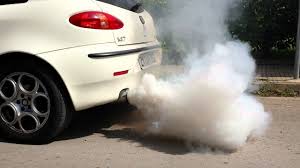Some ecologists have expressed worry over the dire consequences of car pollutants on the environment, explaining that the profusion of exhaust fumes from vehicles in the environment was responsible for the prevalence of some diseases such as cancer in the country.
Speaking on Friday in Lagos, Mr Temitope Ogunweide, an ecologist and founder of CleanEdge Company said that carbon monoxide produced by exhaust fumes from vehicles was the largest contributor to greenhouse gases in the environment.
The greenhouse gases trap heat in the lower part of the earth by blocking infrared heat from passing out and studies say the long-term effect of the development on human health is deadly.
“Most of the vehicles in Nigeria use internal combustion engines; this type of engine mixes fuel with air in a combustion chamber. The mixture burns when ignited, giving off large amounts of energy and leaving behind water vapour, carbon dioxide and other gases as waste products,’’ he said.
Ogunweide urged government agencies in charge of vehicle inspection to intensify the efforts to curb vehicles with excessive exhaust fumes from plying the roads, saying that there was a compelling need to outlaw the movement of such vehicles across the country.
“We already have different agencies that have been established by the government to check air quality control but we don’t even know they exist. Most of the agencies are either understaffed or they lack the equipment needed to carry out their assignment.
“All what government needed to do is to put in place a law to ban or remove vehicles with excessive fumes from plying our highways,” he said.
Ogunweide underscored the need to sensitise Nigerians to the dangers of vehicle exhaust fumes on the environment via the collaboration of the government agencies that were responsible for the monitoring of air pollution.
“Nigerians ought to be sensitised to the growing menace of the exhaust fumes of vehicles which is endangering our planet day-by-day. Federal Emergency Management Agency (FEMA), National Environmental Standards and Regulations Enforcement Agency (NESREA), Ministry of Environment, and Ministry of Health should work together with National Orientation Agency and Nigerian Communications Commission (NCC) in the campaign.
“We can also encourage people to drive less and use bicycles for short distances. Instead of driving their personal vehicles, people should be encouraged to use public transport. However, the ban of vehicles with excess exhaust fumes is a task that cannot be achieved as of now; so we need to also encourage practical ways of offsetting of carbon which we produce by planting more trees,” Ogunweide added.
Mrs Gloria Bulus, an environmentalist and founder of Bridge-that-Gap Initiative, called for the strict enforcement of the vehicular emission laws by the monitoring agencies.
“There are regulations on vehicle emissions in Nigeria, just as what obtains in other developed countries. The regulations on vehicular emissions in Nigeria are called `The National Environmental (Control of Vehicular Emissions from Petrol and Diesel Engines) Regulations, 2011’.
“It is aimed at controlling our air quality and the law has provisions for mandatory yearly testing of vehicles for toxic air emissions and the installation of emission reduction technology in vehicles. Nigeria has about 24 environmental laws but I think our major problem is enforcement of these laws,’’ she said.
Bulus said that the vehicle emission regulations should be enforced by ensuring vehicle inspection, compliance monitoring, legal action and prosecution.
She also called for a partnership between the media, environmental stakeholders and non-governmental organisations (NGOs) in sensitising Nigerians to the dangers of vehicular emissions.
“Environmental and health NGOs and other relevant agencies can also engage in sensitisation and advocacy campaigns, seminars, conferences, workshops and any other means that can be used to reach out to people.
“In years to come the consequences of our action in our environment will be felt badly. Now is the time to swing into action, using any means we can, especially through awareness and advocacy, to help save our environment for the future generation of Nigerians,” she said.
Another environmentalist, Dr Abdulganiyu Adelopo, however warned the government against apathy towards air pollution induced by vehicles.
“Government at all levels ought to make things work in terms of the MOT (Ministry of Transport) test or evaluation of vehicles. Any vehicle that is not roadworthy should not be allowed on the roads,’’ he added.


